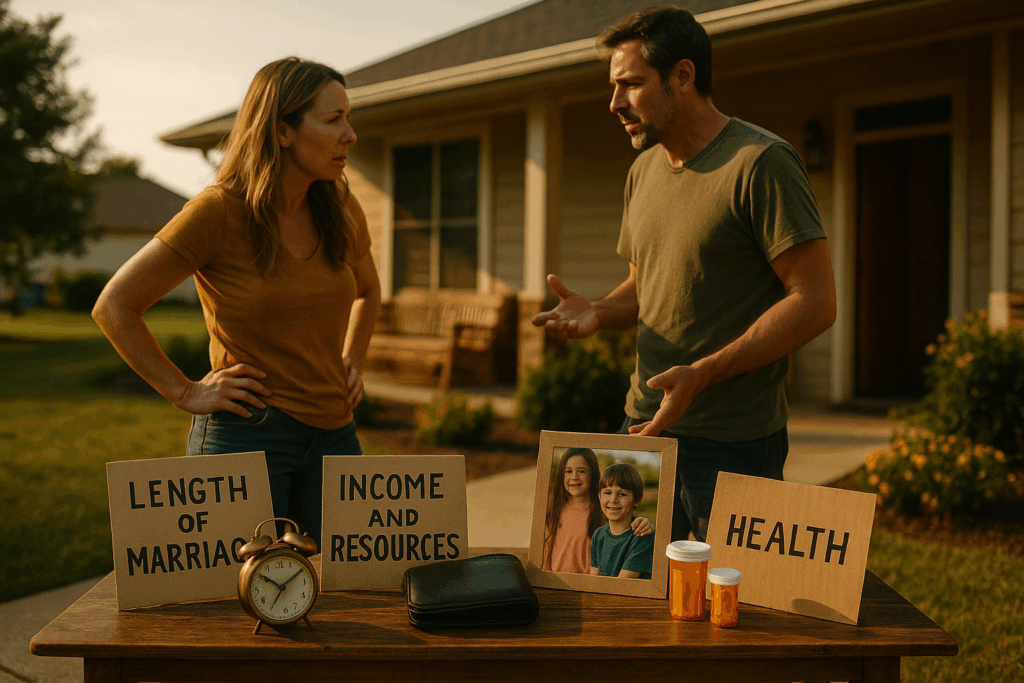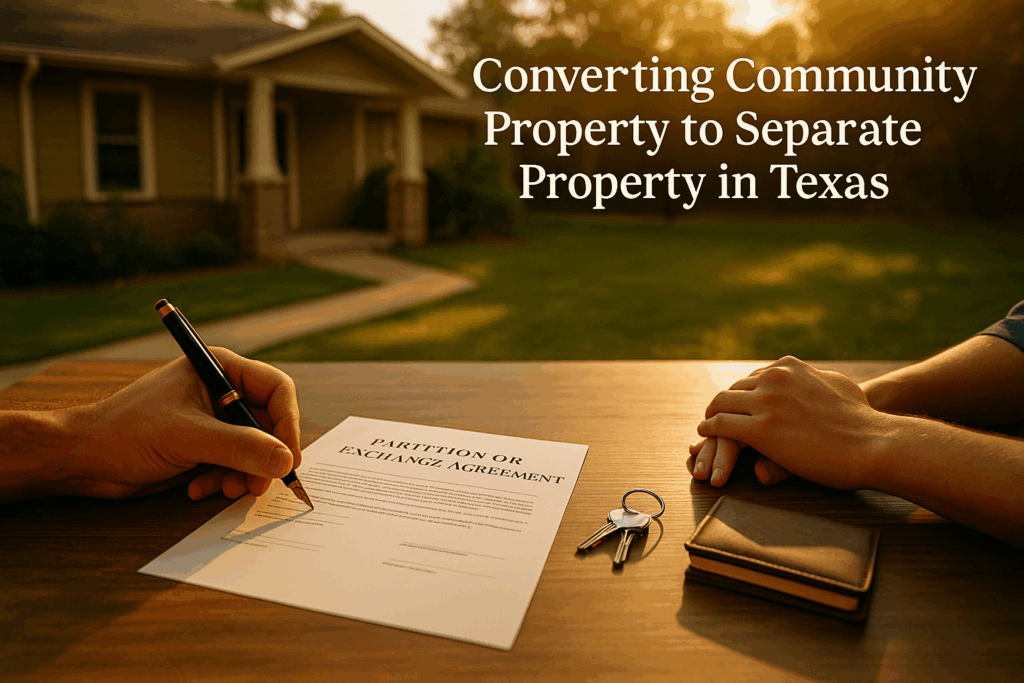
Ever tried splitting up a Netflix account during a breakup? One minute you’re debating who gets the dog, and the next you’re in a silent standoff over who “owns” the blender. But when emotions are high and assets are tangled, what really matters is understanding the rules—especially the ones that affect your future. That’s where community property in Texas comes in, and trust us, it’s a lot more than just legal fine print.
In this post, we’ll break down what counts as community property, what doesn’t, and how those distinctions can impact everything from your home to your peace of mind. You’ll learn how Texas courts handle asset division during divorce, how those decisions can affect your family dynamic, and how to avoid the financial traps that trip up so many people in your shoes.
Along the way, we’ll share tips you can apply today, legal insights most Texans don’t know, and guidance from experienced family law attorneys who’ve helped thousands of people turn legal messes into manageable transitions. So whether you’re gearing up for divorce or just trying to make sense of what’s yours and what’s not—keep reading. This might just be the clarity you’ve been looking for.
Key Takeaways
- In Texas, community property law mandates that assets acquired during marriage are jointly owned by both spouses, with few exceptions for separate property.
- The principle of ‘just and right division’ allows Texas courts to distribute community property equitably rather than strictly equally, considering factors such as duration of marriage and economic needs.
- Protecting assets through documentation and legal agreements is crucial in Texas, with strategies including maintaining separate accounts and utilizing partition agreements to safeguard individual property rights.
Defining Community Property in Texas
In Texas, the concept of community property is foundational to understanding how assets and income are handled during and after In Texas, the concept of community property in Texas is more than just legal terminology—it shapes how assets are identified, valued, and ultimately divided during a divorce. As we’ve seen in our work with Texas families, many are surprised to learn that it doesn’t matter whose name appears on a deed, paycheck, or account. If the property was acquired during the marriage, it’s generally presumed to be jointly owned by both spouses under Texas law.
The foundation for this presumption lies in the Texas Family Code § 3.002, which defines community property as all property—both real and personal—acquired by either spouse during the marriage, except for what is classified as separate property under § 3.001. This includes wages, home equity, retirement contributions, vehicles, and even certain types of debt. The law goes a step further in § 3.003, stating that all property possessed by either spouse during the marriage is presumed to be community property unless proven otherwise by clear and convincing evidence.
This presumption carries real consequences. When a couple decides to divorce, the court is obligated under Texas Family Code § 7.001 to divide community property in a manner that is “just and right,” which doesn’t always mean 50/50. Courts may consider factors like fault in the breakup, earning capacity, and the best interests of any children involved.
Understanding these nuances is essential, especially when it comes to protecting your financial future. For example, many spouses ask, “Do I have any rights to a home that’s only in my partner’s name?” The answer often depends on how and when the property was acquired, as discussed in our detailed article: Does My Spouse Have Rights to the House in a Texas Divorce?.
Our legal professionals have helped many clients understand how property classification works and how to protect what’s rightfully theirs. Whether you’re concerned about safeguarding separate property or ensuring a fair division of community assets, we encourage you to explore our comprehensive guide on property division in Texas divorces for additional insight.
At The Law Office of Bryan Fagan, PLLC, we believe that educating families is one of the most powerful tools we can offer. Knowing how the community property in Texas system works empowers you to make informed decisions that protect not just your assets—but your peace of mind.

Clarifying Separate Property
While community property laws cast a wide net, not all assets acquired during the marriage fall under this category. Separate property, as defined by Texas law, includes assets owned by one spouse prior to the marriage, as well as property received as gifts or inheritances, including the other spouse’s separate property. This distinction is crucial because separate and community property is not subject to division in the event of a divorce.
To maintain the status of separate property, documentation is key. Essential documentation includes:
- Recorded deeds
- Written agreements
- Clear records of ownership These are necessary to validate claims that certain assets should be considered separate property. Without such documentation, it may be challenging to prove that an asset is not part of the community estate.
Exceptions to the general rules of community property also exist. Assets obtained during the marriage are not always classified as community property. Some may be categorized differently based on various factors. Gifts or inheritances received by one spouse remain their separate property, regardless of when they were acquired. Understanding these nuances can help in strategizing asset protection and division.
Just and Right Division of Community Property
When it comes to dividing community property in Texas, the principle of “just and right division” takes center stage. Unlike some states that mandate a strict 50/50 split, Texas courts have the discretion to order a disproportionate division if deemed fair and equitable. This flexible approach allows the court to consider various factors to ensure a fair outcome, ensuring that the property is divided equally.
Several factors influence the division of property:
- The length of the marriage, which can determine the greater need for financial support during the division of assets.
- The involvement of children, where their care and associated costs play a significant role in the court’s decisions.
- Disparities in the education levels and earning capabilities of the spouses, impacting the future financial stability of each party.
The just and right division principle underscores the importance of a nuanced approach to property division. It recognizes that a cookie-cutter solution may not always be fair and allows the court to tailor its decisions to the specific circumstances of each case. This approach aims to balance the scales and ensure that both parties emerge from the divorce with a fair share of the marital estate, which can help to divide the assets equitably.
Common Examples of Community Property
As our attorneys frequently advise, a clear understanding of how community property in Texas applies to real-life assets is essential when preparing for divorce. One of the most common sources of confusion is the family home. According to Texas Family Code § 3.002, any real property acquired during the marriage is generally considered community property—even if only one spouse’s name is on the deed. This means that both spouses have a legal interest in the home, regardless of who made the purchase or paid the mortgage.
Retirement accounts such as 401(k)s, pensions, and IRAs are also commonly misunderstood. Under Texas Family Code § 3.007, any portion of a retirement account contributed to or earned during the marriage is presumed to be community property. These assets often represent a significant part of the marital estate and require specialized tools, like a Qualified Domestic Relations Order (QDRO), to divide them fairly and without tax penalties.
Vehicles acquired during the marriage—whether personal cars, business trucks, or even recreational vehicles—also fall under community property unless proven otherwise. As outlined in Texas Family Code § 3.003, the timing and source of funds used to purchase the vehicle matter more than whose name appears on the title. This reinforces the importance of proper documentation and legal support when classifying assets for division.
To better understand how the law treats shared property like homes and land, we recommend reading this detailed guide on dividing real property in a Texas divorce. You can also explore our property division resource center for additional insights. At The Law Office of Bryan Fagan, PLLC, we’re committed to educating families and protecting futures—because navigating property division shouldn’t mean compromising long-term peace of mind.

Factors Impacting Property Division
As we’ve seen in our work with Texas families, dividing community property in Texas isn’t simply a matter of splitting everything down the middle. Texas Family Code § 7.001 empowers courts to divide community property in a manner that is “just and right,” which means judges may consider a wide range of factors beyond who owns what. One of the most common considerations is the disparity in earning potential between spouses. Courts may examine each party’s age, education, employment history, and ability to generate income after divorce to ensure the division supports long-term financial stability.
Health is another key factor. If one spouse has significant medical needs or limited physical capacity to work, this can influence how the court divides assets, particularly when health-related expenses are ongoing. Under current interpretations of the Texas Family Code, courts may also weigh the burden of maintaining certain community assets—like a home or business—when determining who should retain them, especially if they create unequal financial responsibilities.
Fault in the breakup of the marriage can also shape the division of property. While Texas is a no-fault divorce state, Texas Family Code § 6.002–§ 6.007 allows fault grounds like adultery or cruelty to be presented, and judges may award a greater share of the community estate to the spouse not at fault. Additionally, courts evaluate each spouse’s contributions—financial and otherwise—throughout the marriage to ensure fairness. These considerations often make the difference between an equal split and an equitable one.
To help clients prepare for the documentation and decisions ahead, we recommend reading this helpful article on what documents you’ll have after your divorce is finalized. You’ll find practical insights into what to expect and how to stay organized as you move forward. Our family law team also offers a full breakdown of the Texas property division process to help you understand your rights. At The Law Office of Bryan Fagan, PLLC, our mission is to educate and empower you—because the more you know, the better you can protect your future.

Protecting Your Assets
According to our family law team, safeguarding your personal assets under the rules governing community property in Texas starts with one crucial step: planning ahead. While the law provides clear guidelines on what qualifies as separate property—such as assets acquired before marriage, inheritances, and personal gifts—those protections can quickly vanish if funds are commingled or poorly documented. Under Texas Family Code § 3.001, separate property remains exempt from division in divorce, but only if you can prove its origin and status with clear and convincing evidence.
One of the most effective ways to protect separate property is to maintain dedicated bank accounts and avoid mixing community and separate funds. For example, depositing your inheritance into a joint account can unintentionally convert it into community property. Likewise, keeping a clean paper trail—including recorded deeds, prenuptial or postnuptial agreements, and gift documentation—can help validate separate property claims during divorce proceedings. As our attorneys frequently advise, consistent record-keeping and legal agreements are your strongest allies in asset protection.
In addition, it’s wise to periodically review your estate plan, especially after major life events like marriage, the purchase of real estate, or the birth of children. A clear estate plan that aligns with Texas law—supported by formal documents and agreements—adds another layer of protection. For spouses concerned about real estate ownership in particular, we encourage you to read this detailed article on your rights if your name isn’t on the deed. You’ll discover how Texas courts treat home ownership in the context of marriage, regardless of whose name is listed.
At The Law Office of Bryan Fagan, PLLC, our legal professionals have helped many clients understand what’s at stake and how to proactively shield what matters most. If you’re preparing for marriage, navigating a divorce, or simply wanting to better understand how community property in Texas applies to your situation, our property division resource center is a great place to start. Thoughtful planning today can mean fewer surprises—and stronger security—tomorrow.

Converting Community Property to Separate Property
Converting community property to separate property during a marriage is a viable option under Texas law. This can be achieved through:
- A written partition or exchange agreement
- The agreement must be signed by both spouses
- The agreement must clearly state the property transfer intentions
Such agreements provide a legal framework to establish reclassifying property and safeguarding individual assets through a written agreement on inheritance and money.
For a partition agreement to be valid:
- It must not be fraudulent.
- It should disclose all relevant property information to both parties, ensuring transparency.
- Both spouses must be fully aware of the implications of the post marital agreement.
- Future assets can also be included, providing a comprehensive approach to asset protection.
Once property is designated as separate through a partition agreement, it is protected from division in a divorce. This proactive measure allows couples to clearly delineate their individual assets and avoid potential disputes during the division of the marital estate, including any ownership interest.

Legal Guidance for Complex Cases
As we’ve seen in our work with Texas families, navigating the division of community property in Texas—especially in high-asset or emotionally charged divorces—requires more than just a general understanding of the law. It requires experienced, strategic legal support. According to Texas Family Code § 7.001, courts are instructed to divide community property in a “just and right” manner, which doesn’t always mean a 50/50 split. The reality is far more nuanced, particularly when real estate, retirement accounts, business interests, or commingled assets are involved.
Our legal professionals have helped many clients understand that the right preparation can make a significant difference when facing a complex divorce. Gathering financial records, listing out property and liabilities, and preparing key questions ahead of a legal consultation allows your attorney to develop a tailored strategy that aligns with both your legal rights and your long-term goals. These steps become even more important when fault grounds or reimbursement claims under Texas Family Code § 3.402 are factors in the case.
At The Law Office of Bryan Fagan, PLLC, our team provides personalized, compassionate guidance designed to protect your financial and emotional well-being. We offer free consultations to help you assess your circumstances and understand how community property in Texas may apply to your situation. Whether you’re dealing with business valuations, tracing separate property, or simply unsure what’s at risk, our attorneys will walk you through your legal options with clarity and empathy.
For those beginning the divorce process or seeking peace of mind in the face of uncertainty, we also recommend exploring our comprehensive Texas divorce resources to get a sense of what to expect. With our team by your side, you don’t have to navigate the complexities of property division alone—we’re here to educate, advocate, and protect your future every step of the way.
Call to Action
If you’re preparing for marriage or facing the difficult decision to divorce, gaining a clear understanding of community property in Texas is one of the most important steps you can take to protect your future. Under Texas Family Code § 3.002, nearly all property acquired during a marriage is presumed to be community property—and thus subject to division in the event of divorce. Whether you’re concerned about keeping assets separate or ensuring a fair split, knowing how the law applies to your unique situation is critical.
Our legal professionals have helped many clients understand how to organize financial records, protect separate property under § 3.001, and navigate complex asset division with clarity and confidence. From real estate and retirement plans to debt and reimbursement claims under § 3.402, we provide comprehensive legal strategies backed by years of experience in Texas family courts.
We understand that property is only one piece of the puzzle—especially when children are involved. Custody, support, and parenting plans all intersect with property decisions. That’s why we encourage you to explore this helpful guide on Texas child custody consultations to better understand how custody arrangements and financial planning work together to support your child’s future.
At The Law Office of Bryan Fagan, PLLC, we’re committed to educating families and protecting what matters most. Our free consultation process is designed to give you the insight and support you need to move forward with confidence. Whether you’re entering a marriage or ending one, our team is here to stand by your side—every step of the way.
Conclusion:
Navigating divorce is hard. Doing it while trying to protect your child’s sense of normalcy? That’s a whole different level of parenting—and you’re not alone in that. Whether you’re figuring out school pickups, dividing assets, or just trying to make sure your kid still has time to finish their science project, understanding how community property in Texas plays into all of it gives you a major head start.
If there’s one thing we hope you take from this—it’s that legal decisions and parenting decisions go hand in hand. The way you handle property, custody, and routine today can shape how confidently your child walks into the classroom tomorrow. And with the right support, you can move forward with more clarity and a lot less chaos.
So, if you’re staring down a divorce and wondering how to keep your child grounded while everything else shifts—start by having a conversation with someone who knows how to balance both the legal and the human side of this journey.
At The Law Office of Bryan Fagan, PLLC, we’re here to help you protect what matters most—your future and your child’s. Let’s figure this out together.
And hey—if you remembered to pack your kid’s lunch this morning and still made it to this article? You’re already doing better than you think.
Frequently Asked Questions: Community Property in Texas
What is not considered community property in Texas?
Property owned before marriage, gifts, inheritances, and assets designated as separate by a valid agreement are not considered community property in Texas.
Is my wife entitled to half my house if it’s in my name in Texas?
Yes, if the house was acquired during the marriage, it is likely community property regardless of whose name is on the title. Title ownership alone doesn’t determine classification.
What are the rules for marital property in Texas?
Texas follows community property rules, meaning most income and assets acquired during marriage are jointly owned and subject to division upon divorce, unless proven to be separate property.
How long do you have to be married to get half of everything in Texas?
There is no minimum time requirement. Community property is divided based on what was acquired during the marriage, no matter how short the marriage lasted.
Is a separate bank account considered community property in Texas?
A separate bank account can be considered community property if it contains income earned during the marriage or if funds were commingled with marital assets.
Which is not an example of community property?
A gift or inheritance received by one spouse alone is not considered community property, even if acquired during the marriage, unless it was commingled.
What happens to the house when unmarried couples split in Texas?
Texas law treats property ownership between unmarried couples based on title and contract law. If both names are on the deed, the home is jointly owned. If only one name is listed, that person retains legal ownership unless a written agreement says otherwise.
What are my rights if my name is not on a deed but married in TX?
If the home was purchased during the marriage, it is presumed to be community property even if only one spouse is on the deed. You may still have a legal interest in the property.
What are my rights if my name is not on a deed?
Your rights depend on the context. In a marriage, the home may still be community property. Outside of marriage, you generally do not have ownership rights unless you can prove a financial contribution or agreement.




